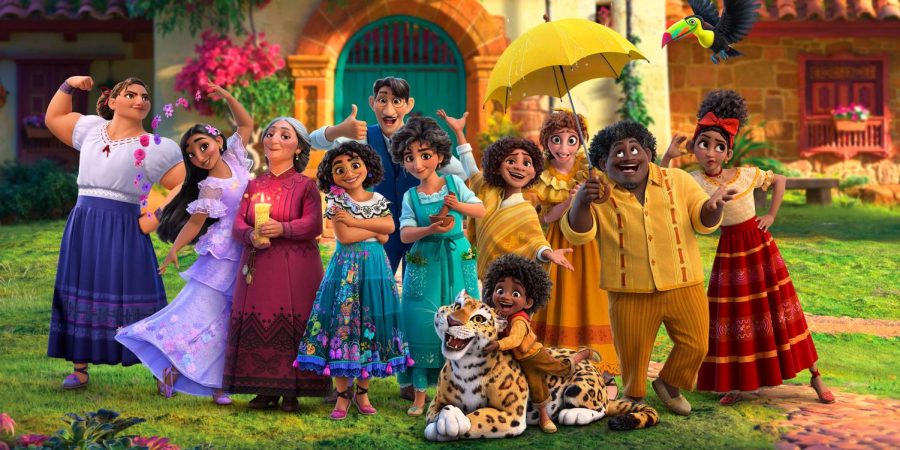Encanto: Disney’s Latest Vibrant Musical
Hailed as a lush, uplifting tale about accepting family, Disney’s newest animated film Encanto was released in November of 2021 and has been echoing in the world entertainment sphere and receiving critical acclaim ever since. Directed by Jared Bush and Byron Howard, the film was written also by Charise Castro Smith, stars Stephanie Beatrix as Mirabel Madrigal and features original songs by Lin-Manuel Miranda. The movie functions as a bright window into Colombian culture, and explores themes of toxic perfectionism and intergenerational trauma.
The film follows the Madrigal family, who all possess magical gifts which allow them to serve the community around their home, which is called the Encanto. The only exception is Mirabel, who did not receive a gift, and is thus quietly shunned and pitied by the rest of her family. When Mirabel realizes that their miracle is dying and that cracks have appeared in the family’s semi-sentient home called the Casita, she sets out to save the magic, unearthing the family’s trauma, secrets, and emotional turmoil along the way.
Encanto has received praises for its discussion of the complex relationships of the Madrigals, especially in the film’s themes about the importance of recognizing one’s family as they are, instead of who you wish them to be. This is explored in multiple ways, from Abuela’s obvious criticisms of Mirabel’s actions throughout the plot, to the sisters’ feature songs, “Surface Pressure” and “What Else Can I Do?” Both of these songs show the way Abuela’s sky-high expectations for her family have been detrimental to everyone, as Luisa (who possesses superhuman strength) confesses that she feels like she is holding up the entire house by herself, and Isabela (who is able to make any flower grow) realizes that she doesn’t have to pretend to be “perfect” all the time. These seldom-discussed topics make the characters more relatable, as Skyline student Zoe Caldwell pointed out. “The best part of the movie were the characters, their interactions, their arcs… Of course, everyone loves the songs and the animations, but for me the reason to watch it is to see the characters, see which ones you relate to, which ones you connect with and how they interact with each other.”
On the YouTube channel CinemaTherapy, in a video discussing the effects of Abuela’s trauma and the family’s relationships, licensed therapist Jonathan Decker commented, “The whole point of this is what they see in each other, that Mirabel sees what her Abuela went through. And while it doesn’t justify the behavior, it makes it understandable, and that makes it easier to forgive. And Abuela sees that Mirabel’s gift isn’t that she is super strong, or that she can create weather, or that she can create flowers […] but that her gift is her kindness, and her integrity, and her ability to unify.”
Many of these emotional elements are conveyed in the film through infectiously catchy songs, which quickly caught social media’s attention and were catapulted into the global top music charts, reaching more popularity than previous Disney “instant classic”, Frozen. Many fans of the film mentioned that they listened to the soundtrack obsessively, especially enjoying “Surface Pressure”, and the explosively popular “We Don’t Talk About Bruno”. Caldwell explained that her personal favorite song is “What Else Can I Do?”.
Although the film has been complimented for its vibrant representation of Colombian culture and complex cast, there has also been criticism of the way its message was conveyed, and its self-contradictory ending. In an article published in The Guardian, Peter Bradshaw voices these complaints. “Encanto feels like it is aspiring to exactly that sort of bland frictionless perfection that the film itself is solemnly preaching against, with a contrived storyline that wants to have its metaphorical cake and eat it. […] The rescuing of [the family’s powers] is the plot motivation, [and] it is an uncomfortable turnaround for these powers to be represented as something to be opposed or surmounted—a paradox which the film does not acknowledge or resolve.” Indeed, the film’s themes of acceptance also gave off inevitable messages of unquestioned forgiveness of toxic family members, as the ending of the movie sees Mirabel forgiving her family and her Abuela, and everyone regaining their previously lost powers. Overall, however, the writers of the film brought the characters to life and put remarkable effort into the animation and music of Encanto, which clearly shone through to make the film enjoyable even if it had to be wrapped in the sparkly positivity typical of Disney films.


